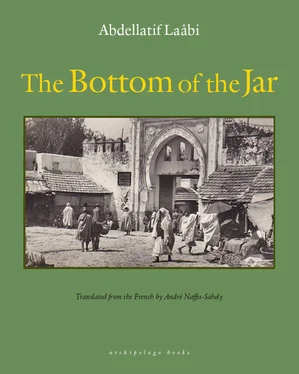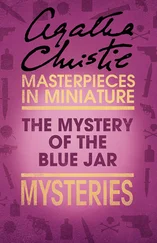Today, however, there was no sign of soup anywhere, not even its aroma. Damn! The deserted square instead smelled of dung and piss. Some donkeys were there, slumped, their eyes half shut, nonchalantly shooing away some extremely persistent flies with their tails. Looking at them, one would think they too were fasting. Namouss would have to wait until noon for the square to spring to life a little. But he was wrong to think that. Because it was Ramadan, this would happen only much later, close to nightfall. Joutiya Square would then transform, as if by a miracle. There would no longer be any buying or selling. Rope dancers and storytellers would divide the square between them and hold the high ground until the first flicker of dawn, vying to outdo each other with their juggling skills and eloquence. The crowds around them would be thick, flabbergasted, and friendly. There were also pickpockets lurking about. Hymns praising the Prophet would fill the air when the collection plate was passed around.
Of all those shows, Namouss’s absolute favorite was the one performed by a character whose reputation extended far and wide, a storyteller who went by the name of Harrba. Physically, he was not particularly striking: a small head set on a scrawny neck, bleary-eyed, and half his scalp eaten away by ringworm. Fact remains that this puny-looking man was a great showman, a peerless narrator who, thanks to his varied repertoire, knew how to keep his audience in suspense. Harrba would sometimes improvise sketches inspired by daily life that made light of his fellow worshippers; other times he told variations of widely known stories, which had never been heard before. A little tambourine perched on his shoulder, and he used it to punctuate his story or to break into drum solos, which he excelled at.
Namouss would go to hear him on his own or with a group of friends. He would lose himself in the flow of his voice, a voice that could mimic those of men and women, the rich and the poor, city slickers and country bumpkins, masters and servants, the hard of hearing and stammerers, corrupt qadis and phony imams, a beggar feigning blindness, a merchant cheating his customers, and a whole other plethora of crooks and fakes. Shifting register, Harrba would allow Namouss to travel back in time and marvel at the miracles performed by ancient saints and prophets, to suffer as they suffered, be swept away by the exploits of heroes waging a relentless struggle against the forces of evil, to watch dumbstruck as Harrba brought a princess’s charms to life: a perfectly placed beauty mark, hair that reached down to the ankles, tits like grenades, and a waist so slender a single hand could clasp it.
Harrba would jump and twirl and about. He would mimic the sound of waves, the wind, thunder, rain, animal calls, evoking sounds as varied as explosive farts to the silent ones weasels make, and would stop — all of a sudden and without warning — to allow the audience to give credit where credit was due.
“Would you like me to carry on?”
“Yes!” they would yell in unison.
“Very well then,” he would say, “the show isn’t free. Dig deep into your pockets and let me hear those coins.”
The show would last up until it was time for the s’hour , the last meal before resuming the fast. Neighboring streets would resound with the songs of the “door knockers,” those messengers of dawn making the rounds from house to house. Using a hammer made out of leather, they would give the doors a sharp blow to let the people inside know it was time to eat. The crowds would then disperse in the blink of an eye. The performers would gather their belongings and follow suit.
NAMOUSS WAS COUNTING on finding Harrba again that night. From where he stood, his fate remained uncertain, so he continued wandering in the hopes that it might drive those unpleasant thoughts away. He started thinking about Driss, and this drew him like a magnet to the souk where the saddlers’ guild was located.
The Sekkatine souk! It felt as if this place was his father’s real home, while their abode in the Spring of Horses indisputably fell under his mother’s jurisdiction. The idea of splitting his life between two homes troubled him. Which one drew him in and comforted him more? One the one hand, Ghita ran the family nest in an orderly and reassuring way; on the other, while his father’s place also had its constraints, it was vitally linked to the city, teeming with life and receptive to echoes from the outside world: the countryside, other cities, the world beyond. And Driss, a respected craftsman, was at the center of all that.
The Sekkatine souk was deserted and all the shops were locked up. Only the watchman was there, lying half asleep on a sack of jute in front of the entrance. Though the watchman eyed Namouss suspiciously at first, he realized he was Maâllem Driss’s son and so asked after him.
“ Yak labass ? How is your father?”
“ Labass, labass ,” Namouss replied, albeit begrudgingly, feeling as though he was being spied on. Namouss had wanted the place all to himself on this most unusual of visits, whose purposes were unknown even to himself.
Turning his back to the watchman, he pushed on through the souk. The row of shuttered shops made him uneasy. Usually he could walk through the market blindfolded and know which shop belonged to whom: his uncle Si Mohammed; the stirrup-maker Meslouhi; the craftsmen Berdaï, Chardane, Amine Rabiî; the shopkeeper Tahiri brothers: Sid Louadi and Sidi Hafid; the Sebtis: Mohammed Lehsiki and his son Haji Mohammed the Younger, a.k.a. the “Screw”; the guild master Haji Abderrahmane Sekkat; etc. His father’s shop was situated right in the middle of the market, just in front of Doukkali’s, the barber-circumciser. Namouss could fill a whole gallery with the portraits of these men. There were kind and not-so-kind men among them, loudmouths and diffident ones, greedy ones and those happy just to make a living, jokers and suckers, those green with envy and those blessed by luck, bashful and cheeky ones, slow and speedy ones, drudges and perfectionists. There was never a dull moment when the Sekkatine was in full swing.
Very early in the morning, it opens. Each shop has an elevated door, with one shutter on the top and one at the bottom. After the lower one is unlocked with a large key, the top shutter is pushed up and fixed in place with the help of a thick wooden stick. A rope hanging from the ceiling allows one to hoist oneself into the shop like an acrobat. The workbench is set at chest level. Only the barber has succumbed to the sirens of modernity. His shop doors open sideways and — the epitome of luxury — are accessed via a series of steps.
That was where Namouss sat to catch his breath and once more lose himself to daydreaming. A smile began to form on his lips. He remembered the mornings when business was slow in the souk — and especially the pleasantries exchanged with the craftsmen who turned up late to work, rosy-cheeked and still wrapped in a towel. That they had just come from the hammam did not escape their co-workers. Once the man in question had opened his shop and laid his towel on the stick that held up the canopy, the jokes were rattled out in quick succession.
“Aha! Someone’s sure taken his time over his major ablutions!”
“I hope the water was warm.”
“Did the masseur look after you well then?”
“La-di-da, maâllem .”
“He must have worn out the lady of the house this morning. How will she get through all the day’s chores now?”
“And the midday meal will surely be ample. These things usually awaken the appetite.”
“May God give us just a bit of your zeal.”
“You must look after your health, maâllem .”
“We should keep an eye out for a second wife for him, just in case the first one throws in the towel.”
Читать дальше












